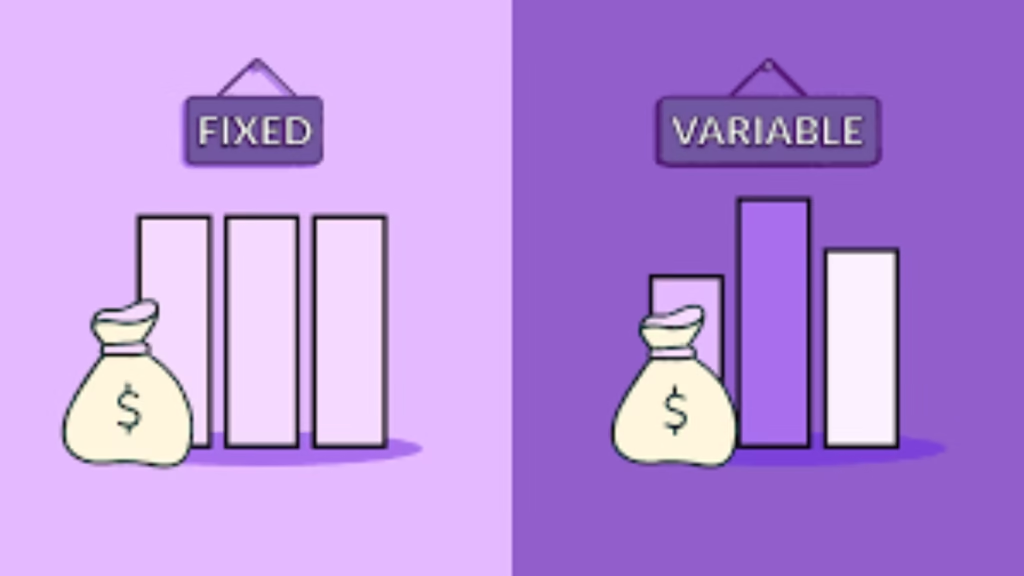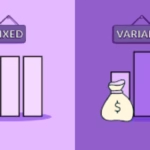Choosing the right car loan is a critical decision for Canadians looking to finance their vehicle purchase. With fixed vs variable rate car loans Canada being a key consideration, understanding the differences, benefits, and risks of each option can help you make an informed choice.
This guide dives deep into the nuances of fixed and variable rate car loans, offering insights into how they work, their suitability for different financial situations, and tips for securing the best deal in Canada. For reliable financing options, explore resources like Quick Approvals, which can streamline your car loan journey.
What Are the Differences Between Fixed and Variable Car Loans Canada?

fixed vs variable rate car loans Canada, Car loans in Canada typically come in two forms: fixed-rate and variable-rate. Each type has distinct features that impact your monthly payments, total interest costs, and financial predictability.
- Fixed-Rate Car Loans: These loans have a consistent interest rate throughout the loan term, ensuring predictable monthly payments. They are ideal for borrowers who value stability and want to budget with certainty.
- Variable-Rate Car Loans: These loans have interest rates that fluctuate based on the lender’s prime rate, which is influenced by the Bank of Canada’s overnight rate. Payments may vary, potentially saving money if rates drop but increasing costs if rates rise.
According to the Bank of Canada, interest rates have fluctuated in recent years, with the prime rate rising steadily through 2024-2025 due to inflation control measures. This makes understanding the difference fixed and variable car loans Canada crucial for budgeting effectively.
Exploring the Pros and Cons Fixed Variable Car Loans Canada
Pros and Cons Fixed Variable Car Loans Canada, Each loan type has its advantages and drawbacks, depending on your financial goals and risk tolerance. Below is a detailed comparison to help you weigh your options.
Fixed-Rate Car Loans: Pros and Cons Fixed Variable Car Loans Canada
- Pros:
- Predictable payments make budgeting easier, especially for those with fixed incomes.
- Protection against rising interest rates, which is valuable in a high-rate environment like 2025.
- Simpler to understand, ideal for first-time borrowers.
- Cons:
- Higher initial rates compared to variable loans in a low-rate environment.
- Less flexibility to benefit from rate decreases.
Variable-Rate Car Loans
- Pros:
- Lower initial rates, potentially reducing interest costs if rates remain stable or drop.
- Flexibility to pay off the loan faster if rates decrease, saving on total interest.
- Cons:
- Unpredictable payments, which can strain budgets if rates rise significantly.
- Higher risk in volatile economic conditions, as seen in Canada’s 2024-2025 rate hikes.
Data from Canadian banks, such as TD and RBC, indicates that fixed-rate loans are more popular among risk-averse borrowers, while variable-rate loans appeal to those comfortable with financial uncertainty. For tailored loan options, Quick Approvals offers a range of solutions to suit different needs.
Evaluating the Benefits of Fixed Rate Car Loans Canada

Benefits of Fixed Rate Car Loans Canada, Fixed-rate car loans are often favored for their stability, especially in an economic climate where interest rates are unpredictable. Here are key benefits:
- Budget Certainty: Monthly payments remain constant, simplifying financial planning.
- Protection from Rate Increases: With the Bank of Canada raising rates to combat inflation (peaking at 3.5% in 2025), fixed loans shield borrowers from unexpected payment hikes.
- Long-Term Savings: In a rising-rate environment, locking in a rate can save thousands over the loan term.
For example, a $30,000 car loan at a fixed 5% interest rate over five years results in consistent payments of approximately $566 per month. This predictability is invaluable for households with tight budgets.
Understanding the Risks of Variable Rate Car Loans Canada
Risks of Variable Rate Car Loans Canada, While variable-rate loans can offer savings, they come with inherent risks, particularly in Canada’s current economic landscape.
- Payment Volatility: If the prime rate increases, your monthly payments or interest costs can rise, impacting affordability.
- Economic Sensitivity: Variable rates are tied to the Bank of Canada’s policies, which are influenced by inflation and global economic trends.
- Financial Stress: Unexpected rate hikes, like those in 2024-2025, can strain budgets, especially for borrowers with variable incomes.
For instance, a $30,000 variable-rate loan starting at 4% could see payments jump from $552 to $600 per month if the rate rises to 6%. Borrowers must assess their risk tolerance before choosing this option.
Comparing current variable car loan rates Canada
Variable car loan rates in Canada are closely tied to the prime rate, which stood at 6.45% in August 2025, according to the Royal Bank of Canada. Typical variable rates for car loans range from prime minus 0.5% to prime plus 2%, depending on the lender and borrower’s credit score. For example:
| Lender | Variable Rate Range | Estimated Monthly Payment ($30,000, 5 Years) |
|---|---|---|
| TD Bank | 5.95%–7.45% | $561–$588 |
| Scotiabank | 6.15%–7.65% | $565–$592 |
These rates are subject to change, so checking with lenders or platforms like Quick Approvals can help you secure competitive offers.
Using a fixed rate car loan calculator Canada
fixed rate car loan calculator Canada, A fixed-rate car loan calculator is a valuable tool for estimating payments and total interest. Most Canadian banks and financing platforms offer these calculators online. For example, inputting a $30,000 loan at 5% over five years yields:
- Monthly Payment: ~$566
- Total Interest: ~$3,960
- Total Cost: ~$33,960
Calculators help compare fixed vs variable rate car loans Canada by showing how fixed payments remain steady while variable payments fluctuate. Many platforms, including Quick Approvals, provide such tools to simplify decision-making.
How Do Variable vs Fixed Interest Car Loans Canada Work?

Understanding the mechanics of these loans is key to choosing the right one.
Fixed-Rate Mechanics: The interest rate is set at the loan’s outset and remains unchanged. Your monthly payment covers both principal and interest, calculated via a fixed amortization schedule. This ensures no surprises, even if market rates rise.
Variable-Rate Mechanics: The interest rate is tied to the lender’s prime rate, which tracks the Bank of Canada’s overnight rate. Payments may adjust monthly, quarterly, or annually, depending on the loan agreement. Some variable loans have fixed payments, with extra interest extending the loan term if rates rise.
For a deeper dive, the Bank of Canada’s resources on interest rates explain how prime rates influence variable loans.
Seasonal Trends and Considerations for fixed vs variable rate car loans Canada
Car loan searches peak in spring (March-May) when Canadians buy vehicles for summer travel. Interest rate announcements by the Bank of Canada, particularly in January and July, also drive searches for current variable car loan rates Canada. In 2025, with rates stabilizing at higher levels, fixed-rate loans are trending among cautious borrowers, while variable loans attract those anticipating potential rate cuts later in the year.
Choosing the Right Loan for Your Needs
Selecting between fixed vs variable rate car loans Canada requires evaluating your financial situation, market trends, and long-term goals. Here’s a quick guide:
| Factor | Fixed-Rate Loan | Variable-Rate Loan |
|---|---|---|
| Budget Predictability | High | Low |
| Risk Tolerance | Low | High |
| Interest Rate Trend | Best in rising rates | Best in falling rates |
For personalized advice, platforms like Quick Approvals can connect you with lenders offering competitive rates tailored to your needs.
Q&A: Common Questions About fixed vs variable rate car loans Canada
1. What Is Better Fixed or Variable Car Loan Canada?

The choice depends on your financial situation and market conditions. Fixed-rate loans are better for those seeking predictability, especially in a rising-rate environment like 2025. Variable-rate loans may save money if rates drop, but they carry risks. Assess your income stability and consult resources like the Bank of Canada’s interest rate updates to gauge trends.
2. How Does Variable Rate Car Loan Work Canada?

A variable-rate car loan has an interest rate that fluctuates with the lender’s prime rate. If the prime rate rises, your payments or loan term may increase; if it drops, you could pay less interest. For example, a $30,000 loan at 4% variable could see payments rise by $50/month if rates increase to 6%. Check lender terms for adjustment frequency.
3. Should I Choose Fixed or Variable Car Loan Canada?

Consider your risk tolerance and financial goals. Fixed loans suit those with fixed budgets, while variable loans appeal to those willing to risk rate fluctuations for potential savings. In 2025, with rates trending upward, fixed loans are safer for many. Use tools on Quick Approvals to compare options.
4. What Are Differences Between Fixed and Variable Car Loans Canada?
Fixed-rate loans have steady payments and rates, ideal for budgeting. Variable-rate loans adjust with the prime rate, offering savings if rates fall but risks if they rise. Fixed loans are simpler, while variable loans require monitoring economic trends, as outlined by the Bank of Canada.
5. What Are the Risks of Variable Rate Car Loans Canada?
Variable-rate loans risk higher payments if interest rates rise, as seen in 2024-2025. This can strain budgets, especially for those with variable incomes. Additionally, extended loan terms may increase total interest if rates climb significantly. Always review lender terms before committing.
Conclusion
Navigating fixed vs variable rate car loans Canada involves understanding your financial priorities and the economic landscape. Fixed-rate loans offer stability, ideal for budgeting in a high-rate environment like 2025, while variable-rate loans provide potential savings but carry risks. By exploring tools like fixed rate car loan calculator Canada and monitoring current variable car loan rates Canada, you can make an informed decision. For further guidance, visit authoritative sources like the Bank of Canada or connect with trusted platforms like Quick Approvals to find the best car loan for your needs.


